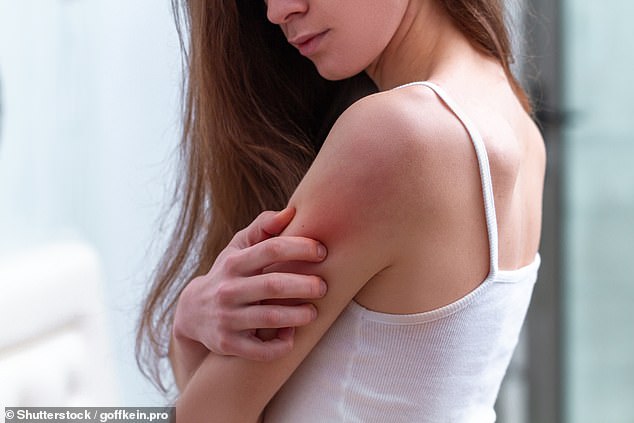A leading pharmacist has revealed little-known dangers of stopping hay fever medications too quickly—and signs you might already be experiencing withdrawal symptoms.
Hay fever season typically runs between late March to September when pollen counts are at their peak.
It is an allergic reaction to pollen, a fine powder which comes from plants. There is more pollen in the air in the spring and summer when plants are flowering.
The reaction usually happens when pollen comes into contact with someone's eyes, nose, mouth or throat.
The tiny seeds and microscopic plant spores can cause some people to develop coughing and sneezing; a runny or blocked nose; itchy, red or watery eyes; itching throat, nose, mouth or ears; headaches and tiredness.
Relief usually only comes after taking antihistamines—which can come as tablets, liquids, eye drops and nasal sprays.
There are two main types of antihistamines, like chlorphenamine, which can cause drowsiness, and non-drowsy options like acrivastine.
For more extreme cases, medics might prescribe corticosteroids, a type of steroid that typically comes in the form of a nasal spray, like Flixonase, which works by reducing inflammation.

'A lot of people take it for a week or two weeks, if they've got exacerbation, and that's not too bad, their body doesn't really switch itself off, but for four weeks or more it can really reduce the body's ability to make that.
But regardless of which sort of hay fever meds you are putting away until next spring, Deborah Grayson, a pharmacist with 30 years' experience told the Daily Mail, you need to be mindful of withdrawal symptoms, which in severe cases can be deadly.
They can include itching, nausea, vomiting, headaches, sweating, anxiety, and dizziness—all common symptoms of other conditions—which can hide the fact that you're experiencing withdrawals.
Ms Grayson warned that it is particularly vital to taper off corticosteroids slowly, as there is a real danger of life-threatening complications.
'The way they work is to mimic the hormone cortisol that comes from the adrenal glands.
'So, because you're taking the corticosteroids, the body doesn't realise it doesn't produce cortisol itself, and it switches itself off.
'So, if you suddenly stop the steroids without weaning off, it takes too long for the body to realise it has to kick in, and it almost mimics a condition called Addison's disease which is when the adrenal glands stop working completely.'
Addison's disease is when the adrenal glands don't produce enough cortisol, causing symptoms like fatigue, weight loss, muscle weakness and salt cravings.

'Because usually that itch and scratch is worse overnight. We tend to get a lot hotter as we approach the evening, so it may well be that they are having a hives flare up, because the antihistamines aren't there to dampen it anymore.'
Ms Grayson continued: 'They do eventually come back online, but in the period of time it takes for them to come back online, you can have what is called an Addisonian crisis which can be fatal.'
The NHS says Addisonian crisis is a medical emergency that needs immediate treatment, as it can cause seizures, loss of consciousness, stroke and a cardiac arrest.
Worryingly, she says there are few early warning signs that this complication is occurring. 'A lot of people just end up collapsing and having to be blue-lighted to A&E,' she said.
However, in less severe cases, there are signs you may be suffering from withdrawal symptoms when stopping antihistamine medications, like mysterious scratch marks on your skin.
She explained: 'If you tend to get hives, it may well be that when you're asleep, when you're not having the benefit of antihistamine, you might be scratching more without realising.
But there are things you can do to prevent withdrawal symptoms.
Ms Grayson said: 'The key for all of these medications is to taper them as slowly as possible, always under medical supervision. The more sensitive you are, the slower you need to go.
'If symptoms become unbearable after a dose reduction, it is usually a sign that the taper needs to be slowed further.'
She added: 'Managing stress and ensuring plenty of rest can help in some cases. Staying well hydrated, taking gentle exercise, eating healthy, prioritising sleep and practicing relaxation may also help.
'Having something to occupy the mind, such as a hobby, puzzles or crafts, can also provide useful distraction during withdrawal.'
Read more- Could your everyday hay fever medication secretly be feeding your risk of dementia? Discover which common allergy remedies might be a hidden danger!
- Is your trusty hay fever relief silently pushing you toward dementia? Harvard expert warns of unexpected risks with common antihistamines!
- Could your allergy relief be a hidden dementia risk? Discover what this doctor says about long-term Benadryl use!
- Is your trusted allergy relief doubling as a dementia danger? Find out why experts are urging a switch away from common anticholinergics now!
- Are common antihistamines really the secret to conquering hay fever's relentless symptoms?
Post a Comment for "Pharmacist warns hay fever sufferers to be aware of antihistamine withdrawal - and the dangers"